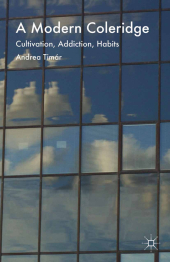 Neuerscheinungen 2017Stand: 2020-02-01 |
Schnellsuche
ISBN/Stichwort/Autor
|
Herderstraße 10
10625 Berlin
Tel.: 030 315 714 16
Fax 030 315 714 14
info@buchspektrum.de |

A. Timár
A Modern Coleridge
Cultivation, Addiction, Habits
1st ed. 2015. 2017. xi, 180 S. 216 mm
Verlag/Jahr: SPRINGER PALGRAVE MACMILLAN; PALGRAVE MACMILLAN UK 2017
ISBN: 1-349-70884-4 (1349708844)
Neue ISBN: 978-1-349-70884-0 (9781349708840)
Preis und Lieferzeit: Bitte klicken
A Modern Coleridge shows the interrelatedness of the discourses of cultivation, addiction and habit in Coleridge´s poetry and prose, and argues that these all revolve around the problematic nexus of a post-Kantian idea of free will, essential to Coleridge´s eminently modern idea of the ´human´.
Acknowledgments List of abbreviations Introduction PART I: CULTIVATION 1. Cultivating Reason and the Will 2. The Shaping Spirit of Education 3. Staging Education: ´The Appeal to Law´. Wordsworth´s ´Peter Bell´. And ´The Ancient Mariner´ 4. Sympathy: Adam Smith and Coleridgean Education PART II: ADDICTION 5. Re-reading Culture and Addiction: Coleridge´s Writings on Civilisation and Walter Benjamin´s Analysis of Modernity and the Addict 6. Craving for Novelties - Craving for Novels: The Politics of Intoxicated Reading 7. He ´did not write, he acted poems´: Kubla Khan, Luther and Rousseau PART III: HABITS 8. ´habits of active industry´ (AI, 49) 9. The Habit of ´abstruse research´: ´Dejection: and Ode´ Conclusion: Cultivation through Love: ´Effusion XXXV´ and ´The Eolian Harp´ Bibliography Index
"ANDREA TIMµR´S STUDY BRINGS A FRESH PERSPECTIVE to the problem of Coleridge´s mature politics by viewing his concerns about the dangers of the fast ´diffusion of information and knowledge´ (64) and restless craving for ´the wonders of the day´ (63) alongside the similar concerns of Walter Benjamin, who-in the years leading up to the Second World War-identified the deleterious effects of modernity." (Paul Cheshire, The Coleridge Bulletin, Issue 51, Summer, 2018)
"Deployment of the three motifs of cultivation, addiction, and habit gives a welcome thematic coherence to the whole, particularly as the argument gathers up the interrelations of the three. This framework to the book also gives a sense of anticipation for readers, enhanced by the presentation of interesting combinations of texts. ... the ambitious reach of the book and the interest generated by the trajectories of its investigations commend it to others working on this topic ... ." (Murray J. Evans, Romanticism, vol. 24 (2), July, 2018)
"Timár´s Modern Coleridge is certainly a well-researched and thought-provoking study with a very original focus on Coleridge´s (sometimes unexpected) modernity. It is a rare book in that it effectively combines historical context with multifarious pieces of Coleridge´s works, offering new insights into the author´s epistemological approach to poetry and life in general." (Annalisa Volpone, Hungarian Journal of English and American Studies, Vol. 24 (1), 2018)
"It is clear that this book, imaginatively structured, energetically researched and lucidly written ... is one with which readers of Coleridge are going to have to engage. For this reader, it is the most provocative and exciting book on Coleridge for decades." (Stephen Bygrave, The BARS Review, Issue 47, Spring, 2016)
"Timar provides a comprehensive yet thoroughly modern take on Samuel Taylor Coleridge´s ideology ... . The reader is treated to a groundbreaking and thoroughly modern account of Coleridge´s mind´s inner workings. ... Timar shows that Coleridge transcends his place and time, making movements that can and should be seen as precursors to the modern. Indeed, Timar´s book is dense, but only because each claim that is made is thoroughly corroborated with research." (Eric Englert, Christianity & Literature, Vol. 65 (3), 2016)
"Andrea Timár describes her compact and engaging study of Coleridge as a first attempt to bring into conversation the ´discourses of cultivation, addiction, and habit´ ... . Timár´s study succeeds in highlighting aspects of Coleridge´s uniquely complex and profound reflections on human agency, education, imagination, and how our grasp of these issues remains perennially suspended between empirical and transcendent frameworks." (Thomas Pfau, Studies in Romanticism, Vol. 55 (1), 2016)


